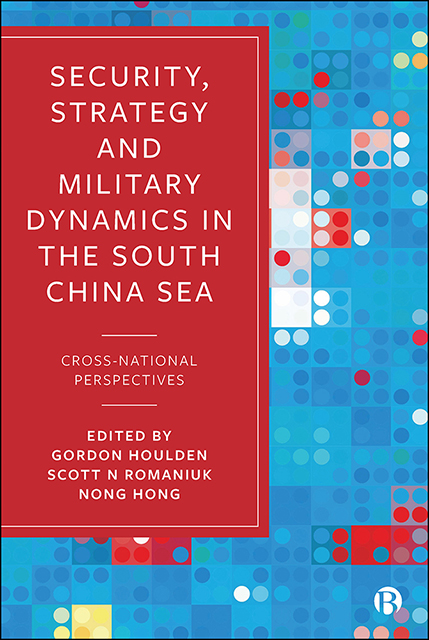Book contents
- Frontmatter
- Contents
- List of Tables
- Notes on Contributors
- Foreword
- Introduction: Strategic Challenges and Escalating Power Rivalry in the South China Sea
- 1 Between Competition and War: Complex Security Overlay and the South China Sea
- 2 The South China Sea as an Echo Chamber of Chinese Foreign and Security Policy
- Part I Claimants of the Contested South China Sea
- Part II Non-Claimants in Southeast Asia
- Part III Quadrilateral Security Dialogue States
- Part IV Non-Claimants in Europe and Eurasia
- Conclusion: Looking over the Horizon – Prospects for Settlement of the South China Sea Dispute?
- Index
18 - South Korea and the South China Sea: A Middle-Power Model for Practical Policies?
Published online by Cambridge University Press: 13 April 2023
- Frontmatter
- Contents
- List of Tables
- Notes on Contributors
- Foreword
- Introduction: Strategic Challenges and Escalating Power Rivalry in the South China Sea
- 1 Between Competition and War: Complex Security Overlay and the South China Sea
- 2 The South China Sea as an Echo Chamber of Chinese Foreign and Security Policy
- Part I Claimants of the Contested South China Sea
- Part II Non-Claimants in Southeast Asia
- Part III Quadrilateral Security Dialogue States
- Part IV Non-Claimants in Europe and Eurasia
- Conclusion: Looking over the Horizon – Prospects for Settlement of the South China Sea Dispute?
- Index
Summary
Introduction
This chapter examines the South Korean perspective on the South China Sea (SCS). There are various entrenched disagreements between surrounding states, which dispute economic rights and legal jurisdiction, and the SCS is also the principal theatre in which the great-power games between China and the US are played out. The problems of the SCS have a wider destabilizing effect upon East Asian maritime security, and this poses strategic issues for other regional states, such as South Korea; the importance of the SCS as a trade route means that there are also global economic ramifications.
As a responsible stakeholder, South Korea is concerned that the peace and good order of the region are threatened by the intractable attitudes of the parties involved, which seem committed to irreconcilable legal and political stances, and show little interest in resolving their differences through negotiation. On the contrary, there is an ongoing process of escalation: smaller countries are building up their navies and maritime law forces, China is also expanding its capabilities, including by creating and militarizing artificial islands in the SCS, and the US is also behaving provocatively.
As a regional middle power, South Korea is advocating balanced and constructive policies, without prejudice to any country, and is seeking to mitigate tensions and de-escalate disputes, so that regional maritime security can be restored and the threat of serious physical conflicts can be reduced.
Why is a strategic perspective needed?
Underlying every issue in the SCS today is the challenge to the existing order represented by the expanding power of China, which threatens the US regional hegemony and perhaps its global dominance. In response, the US has taken some provocative steps, including naval transits of the Taiwan Strait and the so-called Freedom of Navigation Operations (FONOPs) in the SCS. This action-reaction cycle between China and the US has also prompted a general urge toward naval modernization by regional states.
Fortunately, there are no direct military confrontations occurring in the SCS, and in contrast to the ongoing wars of the Middle East, there are no refugees. The SCS situation is best characterized as a “grey zone” conflict or as “hybrid competition” between the parties involved.
- Type
- Chapter
- Information
- Security, Strategy, and Military Dynamics in the South China SeaCross-National Perspectives, pp. 349 - 370Publisher: Bristol University PressPrint publication year: 2021

